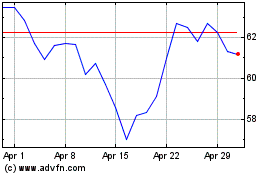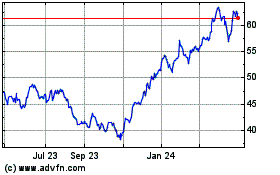Libyan Fund Officials Didn't Understand Goldman Trades, Attorney Says
June 28 2016 - 6:30PM
Dow Jones News
Libya's sovereign-wealth fund was "astonished to learn" it
hadn't acquired any actual shares through derivatives trades
arranged by Goldman Sachs Group Inc., according to a former lawyer
for the fund who gave evidence in the High Court in London on
Tuesday.
The Libyan Investment Authority, or LIA, is suing Goldman for
$1.2 billion to cover its losses from nine trades arranged in 2008.
Those trades took the form of equity derivatives and expired
worthless in 2011. The LIA alleges that Goldman executives exerted
"undue influence" over its officials, who didn't understand the
trades. Goldman earned about $222 million from the trades,
according to the LIA. Goldman disputes the amount of profit it
made. Goldman denies wrongdoing in the case. Its lawyers have said
that the LIA chose to make the trades, which didn't perform as
expected because of the global financial crisis.
"We maintain that the LIA fully understood the disputed trades,"
a Goldman spokesman said. "The LIA's claim has no merit and we
vigorously defend it."
Catherine McDougall was temporarily transferred to the LIA by
London-based law firm Allen & Overy for six weeks in July and
August 2008. She told the High Court on Tuesday that after arriving
in Tripoli she was surprised to learn that the Libyan fund managers
didn't understand the trades they had entered into with
Goldman.
"There was a sea of confusion at the LIA, which ranged from an
understanding that they had purchased shares, quasi-shares or
shares with deferred payment," Ms. McDougall said. "I was really
surprised as it did not take rocket science to realize that the
product was completely synthetic," she said. "There were no shares
involved." The cash-based trades were tied to movements in the
share prices of companies including Citigroup Inc. but didn't
confer ownership of the shares.
The Libyan fund managers were "in awe" of Goldman banker Youssef
Kabbaj, whom they saw as a friend and had "complete trust" in, Ms.
McDougall said in her witness statement. Mr. Kabbaj "exploited"
them, she said. "I expect Goldman Sachs to correct the facts and
protect my reputation," Mr. Kabbaj wrote in a June 13 email to The
Wall Street Journal.
"I explained that he was actually a salesperson who would have
seen the LIA as an opportunity to earn a large bonus," she said in
her statement. "They did not understand how Goldman Sachs staff
would personally benefit from these trades through bonuses and
promotions."
Goldman's lawyer, Robert Miles, asked her if LIA officials were
"trying to blame" the New York-based investment bank because they
had realized by July 2008 that the trades weren't working in their
favor. "I don't think so," Ms. McDougall responded.
Mr. Miles has spent almost two weeks questioning current and
former LIA officials to try to show that they understood more about
finance and the trades than they claimed.
The trial provides a rare insight into the workings of a
fledgling sovereign-wealth fund as Wall Street banks scrambled to
win business. The LIA was created in 2006 to manage income from
Libya's oil fields after the country was removed from the U.S.
government's list of state sponsors of terrorism.
Emails between Goldman bankers reveal one executive comparing a
Libyan to "someone who lives in the middle of the desert with his
camels," court documents show. On training visits to Goldman's
London office, Libyan officials were entertained in restaurants,
documents show. The younger brother of senior LIA official Mustafa
Zarti received a Goldman internship in a bid to gain influence and
business, the fund alleges. Goldman says the internship isn't
important. "We do not believe the internship influenced in any way
the LIA's decision to enter into the trades," a Goldman spokesman
said.
Goldman's relationship with the LIA finally broke down in a
"stormy meeting" in Tripoli on July 23, 2008, which Ms. McDougall
said she attended along with Goldman bankers including Mr. Kabbaj
and LIA officials. During the meeting, Mr. Zarti said that Goldman
had "screwed" the LIA, according to Ms. McDougall.
"He launched into a very angry tirade, saying that he had a bad
side as well as a good side and that he could come after their
families," she wrote in her statement. "Mr. Kabbaj's face became
white in shock." Mr. Zarti then cursed Mr. Kabbaj in English, she
said.
Mr. Kabbaj no longer works at Goldman and isn't due to testify
in court. In his June 13 email to The Wall Street Journal Mr.
Kabbaj referred to a November 2008 letter sent by law firm Withers
to Goldman on his behalf. The letter has been disclosed in
court.
The letter said that during the July 23, 2008, meeting in
Tripoli, Mr. Zarti called Goldman "a bank of Mafiosi" which had
lied to him about the trades. "I can make you disappear and nobody
will ever hear back from you," Mr. Zarti told Mr. Kabbaj, according
to the letter. A spokesman for Mr. Zarti declined to comment on the
court case.
Following the meeting, Mr. Kabbaj met with senior Goldman banker
Andrea Vella to discuss what to do, according to the letter. Mr.
Vella was "in the background of all the trades and was effectively
in charge of the day-to-day commercial relationship," the letter
said. The letter demanded that Goldman pay Mr. Kabbaj a $9 million
"guaranteed bonus" otherwise legal proceedings would be commenced
against the bank. Goldman agreed to pay Mr. Kabbaj $4.5 million,
court documents show.
Goldman's Mr. Vella is due to appear in court on Thursday for at
least four days. Philip Edey, the LIA's lawyer, asked Judge Vivien
Rose to read the 2008 letter before Mr. Vella appears in court.
Goldman said Mr. Vella wasn't available for comment.
Write to Simon Clark at simon.clark@wsj.com
(END) Dow Jones Newswires
June 28, 2016 18:15 ET (22:15 GMT)
Copyright (c) 2016 Dow Jones & Company, Inc.
Citigroup (NYSE:C)
Historical Stock Chart
From Mar 2024 to Apr 2024

Citigroup (NYSE:C)
Historical Stock Chart
From Apr 2023 to Apr 2024
